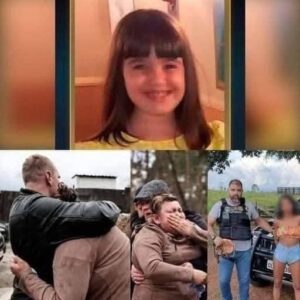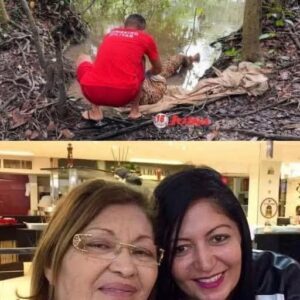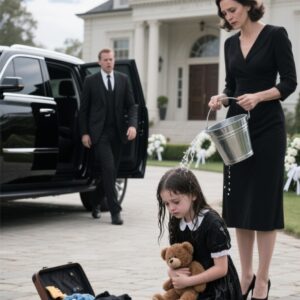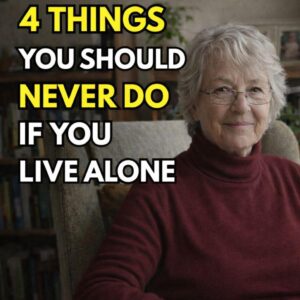We rent out our flat cheaply because the old next-door lady is crazy. She starts making loud noises at 4 a.m. to annoy the neighbors. A young man came to rent. We told him about it and he just smiled. A year passed, we were stunned that he’s still there—nobody lasted more than 8 weeks. Then, the lady died. We entered her flat and were horrified to find…
…handwritten letters. Dozens of them. Stuffed in drawers, taped behind furniture, tucked in coat pockets, and some even under the floorboards. All addressed to someone named “Jonas.”
We stood there, mouths open, staring at the mess. Her flat wasn’t filthy, just… eerie. The walls were full of scribbles, tallies, and calendars with certain dates circled in red. Her kettle was still warm when they found her. It was like she had just stepped out and forgotten to come back.
That young man—his name was Marcus—we asked him if he ever noticed anything odd. He shook his head and said, “She was kind to me.”
Kind? To him?
We’d known her for over a decade. Her name was Mrs. Dragu. Every morning like clockwork, at 4:00 a.m., she’d drag her cane along the corridor walls, slam cupboard doors, and stomp in place like she was rehearsing for a parade. Then, out of nowhere, she’d cackle like she was at a comedy show only she understood.
We asked Marcus what he meant. He said, “She brought me soup when I was sick. Listened when I talked. Even gave me a chessboard.”
I looked at my partner and whispered, “Is he messing with us?”
But Marcus wasn’t the sarcastic type. He meant every word.
After the police did their check and released the flat, we were allowed to go in. Not for fun—she didn’t have any family. No kids. No siblings. The city just needed someone to handle her belongings, and since we were the owners of the building, it fell on us.
That’s how we found the letters.
There were over a hundred, dating back to the early 80s. All written in the same shaky cursive, always addressed to Jonas. Some were full of apologies. Others were angry rants. And a few… were just poems. Sweet, almost childlike, with little sketches in the margins—birds, teacups, clouds.
We sat on her old carpet and read one out loud.
“Jonas,
Today I heard the violin again. You said you’d come back when I did. Well, I did. I painted the hallway yellow like you liked. I even baked that nut cake. But you didn’t come. I’m tired now. Maybe next spring?”
We realized Jonas had been someone she lost a long time ago. Maybe her husband, a lover, a son. We weren’t sure. There were no photos, no records. Just the letters.
Marcus asked if he could read some. We hesitated but handed him a stack.
He sat cross-legged like a kid at storytime and read silently for a while. Then he said something that made my skin crawl.
“She told me about Jonas. She said he played violin and had a birthmark on his left cheek.”
He wasn’t lying. We found a letter that said exactly that.
“You never liked wearing the hat, Jonas. Said it made your head itch. I told you to wear it anyway. Remember? That summer when the sun turned your birthmark red like a strawberry…”
“Wait—how do you know that?” I asked.
“She told me,” Marcus repeated, like it was the most obvious thing in the world.
“She barely spoke to us in ten years,” I said.
He shrugged. “She talked to me.”
I didn’t know what to make of it. Was she a lonely old woman who finally found someone who listened? Or had she simply mellowed with age?
A week passed. We started cleaning out her flat properly, sorting items for donation, storage, or trash. Marcus helped. Volunteered, even.
One morning he came down carrying a dusty box marked “records.” Inside were vinyls—lots of classical music. Some were cracked or warped, but a few were in good shape. Marcus kept one.
“Why that one?” I asked.
He flipped it over and showed me the back. In faded pen, it read, “Jonas plays Track 3.”
We listened to it that night. Track 3 was a soft, haunting violin solo. Beautiful. Melancholic. It gave me chills.
And here’s where the twist begins.
One evening, Marcus came to us, eyes wide, holding something wrapped in cloth. He opened it slowly—it was a violin.
“I found it behind her wardrobe,” he said.
It was old, missing a string, the wood slightly warped from time. Inside the case was a folded paper with just four words: “Find your own voice.”
He took it upstairs.
The next morning at 4 a.m., we heard violin music.
Not chaotic noise. Not scraping. Real music. Gentle, like raindrops on glass.
We ran up to his door and knocked.
He opened it, smiling. “Thought I’d try.”
“You play?” my partner asked.
“I’m learning. She told me I should.”
“She told you?”
He nodded, then pointed at a small photo on his shelf.
It was Mrs. Dragu, young and smiling, standing next to a teenage boy holding a violin. The boy had a strawberry-like mark on his cheek.
“She gave it to me before she passed. Said I should know what love looks like before it disappears.”
That shook us. She knew she was dying?
That same week, Marcus told us he was moving out.
“Wait—now?” I said. “You made it through a year. What changed?”
He smiled. “I found what I came for.”
We were confused. He left the next day with just a backpack and the violin.
A few months went by. We rented out the flat again—twice. Both renters lasted less than two months. They said the place felt “too quiet.” Too heavy.
Then, one morning, we got a letter. No return address. Inside was a newspaper clipping from a small town miles away. The headline read:
“Young Man Revives Town Square With Violin Performances Honoring Local Legend.”
There was a photo of Marcus, playing in front of a fountain, surrounded by flowers.
In the article, he talked about how an old woman once gave him a violin and told him to find his voice. He said he played every morning at 4 a.m., not to wake people, but to greet the day like she did—with noise, with presence, with feeling.
“She wasn’t crazy,” he said in the interview. “She was waiting to be heard.”
That changed how we saw her.
We went back into her flat. This time, not to clean or donate. Just to sit.
We found another note we’d somehow missed. Taped to the inside of a drawer.
“Dear kind stranger,
If you read this, then you’ve outlasted me. Good.
I hope you listened. Not just with your ears, but with your heart.
Jonas always said silence is crueler than any scream.
Make music. Even if it hurts.
Love,
L.”
We kept that note. Framed it.
And the next morning, we didn’t sleep in.
At 4 a.m., we walked the corridor where she used to stomp and sing.
We didn’t hear noise. We heard echoes. Of someone who never gave up talking, hoping someone would finally listen.
Here’s the thing.
Sometimes people seem unbearable. Loud. Messy. Inconvenient.
But what if they’re just trying to be seen?
What if every annoying habit is a thread connecting them to someone they lost?
Or a call into the void, begging for an answer?
Mrs. Dragu wasn’t crazy. She was heartbroken.
And Marcus? He wasn’t just a tenant. He was a bridge.
The one person who looked at her and said, “I see you.”
That’s the twist. That the person everyone warned you about might just be the one who teaches you the most.
So now, every year on the day she died, we play her record. Track 3. Volume up.
Not to remember the noise—but the story behind it.
And maybe that’s the real message here.
Don’t rush to silence the ones who seem disruptive. Sometimes they’re singing the only song they know—the one that kept them alive when everything else faded.
And if you get the chance… be the one who listens.
If this story moved you, share it with someone who might need to hear it.
Like it. Pass it on. Let someone know they’re not alone.






